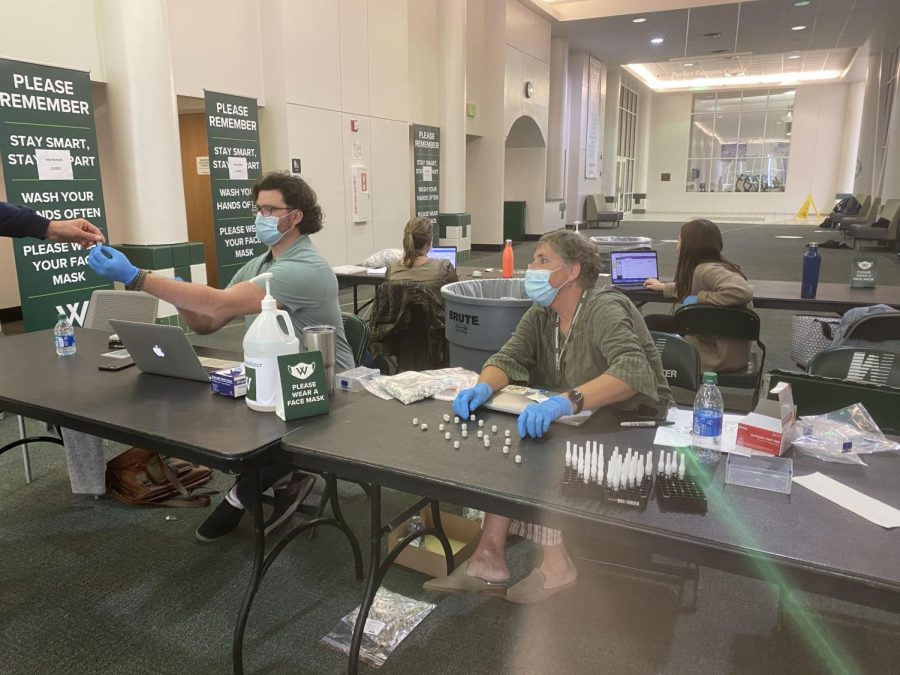Westminster implements weekly COVID-19 testing on campus
Photo credit Selle James
Kelley and Tyler Day organize students’ saliva samples during weekly testing.
To combat COVID-19 transmission when Westminster first began the school year, Westminster tested all members of the community to prevent spread as students returned. From Aug. 17 to Sept. 8, Westminster students attended school through a hybrid model of online learning on Zoom and in-person learning. Once Westminster transitioned to fully in-person learning, students participated in another round of testing, which found few positive cases. Westminster also implemented mandatory masks at all times, except when students eat and drink.
To further ensure the safety of the Westminster community, another round of testing on the in-person students took place on Oct. 14, but it looked a little different. Instead of utilizing nasal swab tests, Westminster has transitioned to collecting samples of students’ saliva.
“After collecting the saliva samples, [medical practitioners] put 24 of those samples into a machine to be tested all at once,” said Jim Justice, the dean of academics and curriculum. “This allows for the testing process to be more efficient and cheaper. If there is a positive test in any of those groupings, we can easily narrow it down and identify the positive test.”
Westminster’s testing takes part in one of three labs that received national approval to use Yale University’s SalivaDirect protocol. University scientists developed this protocol over the summer for schools and businesses; this method allows for quick, noninvasive, and accurate large-scale testing in communities like Westminster. Other groups utilizing this protocol include the NBA.
Medical practitioners first used pooled testing during World War II, collecting urine samples in order to detect syphilis among soldiers. The chemical reagents used to test the COVID-19 saliva batches are inexpensive, costing around $1.29 to $4.30 per batch of 24 samples. Because of the SalivaDirect protocol, students and faculty can easily provide specimen samples at the beginning of each week.
“As we head into the cold and flu season, along with indoor winter sports, weekly testing can really help to keep our community safe,” said Justice.
After the first round of SalivaDirect testing, nine members of the Westminster community tested positive for COVID-19, with six cases in the Lower School, one case in the Middle School, and two cases in the Upper School.
“I honestly prefer the spit testing over the nose testing,” said senior Caroline Hagood. “The nasal swab was painful, and the spit testing is much faster and easier.”
Nasal swab testing, also known as a PCR test, provides the most accurate results in identifying COVID-19 viral loads. Unlike the pooled saliva test, however, the PCR test requires a practitioner to administer the test individually by inserting the swab in the cavity between one’s nose and the mouth.
“I prefer the saliva testing a lot more because it definitely is a much easier process than testing each individual nasal swab, which is not very comfortable.” said freshman Fifo Chlopek.
As the semester continues, Westminster hopes to continue testing students, faculty, and staff with the saliva sample batched testing. Students with the last names A-L test throughout the day on Mondays, and students with the last names M-Z test throughout the day on Tuesdays.
“Wearing masks at all times and the weekly pooled testing is a powerful combination to crush the virus transmission, especially when coupled with distancing and hand washing,” said Justice. “A cadence of weekly testing is incredibly beneficial in identifying positive cases, especially in a large community like Westminster.”
Not only does weekly testing ensure the safety of the Westminster community, but it also serves to preserve the in-person educational experience of the students.





